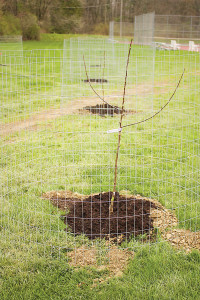Professor Ron Oakerson moderated the Environment and Politics Debate that took place in Schaller Hall last Thursday. Sponsored by the Eco Reps Club, the purpose of this debate was to discuss issues concerning climate change, fracking, and pipelines. Sarah Duttweiler ’17, Claire Brower ’18, and Bekah Potts ’17, represented the progressive view, while Alex Conklin ’17 and Jonathan Libby ’20 represented the conservatives.
Before launching into the debate, Oakerson asked each side for their opening comments. The progressive team argued climate change is a prevalent issue today. It “affects the most vulnerable people on our planet,” argued Potts. They advocated policy changes and hoped to inspire a personal approach to climate change. Libby, from the conservative team, emphasized that “everything scarce; everything has a limit.” The purpose of their argument was to challenge the notion that policy changes are a serious issue.
Oakerson’s first asked “What policy changes should our political leaders make concerning climate trade?” The conservatives argued policy changes are unnecessary, as long as people are doing their part. In response, the progressives brought to light the fact that, while major companies have acknowledged the problem, particularly with carbons, most consumers prioritize convenience.
The follow-up question asked for thoughts concerning the carbon tax, and if it is “politically feasible.” Libby stressed a carbon tax would have to be government funded, and stated, “We are still paying for it, in some way or another, as a whole, toward the increased payment laws being made toward any carbon based product, as long as consumers are okay with paying for that. A carbon tax would raise prices on almost everything we buy.” The progressives agreed a carbon tax is “probably not” feasible.
The second topic, hydro-fracking,provoked increased disagreement between the opposing sides. The Institute for Energy and Environmental Research define hydraulic fracturing as “A technique in which large amounts of water, combined with smaller amounts of chemicals and sand, are pumped under high pressure into a drilled gas well.” The conservative panel cited many instances in which hydro-fracking is detrimental to the environment. Duttweiler said it “releases more methane into the air, which is a leader of greenhouse gasses.” Additionally, hydro-fracking pollutes drinking water because it leaks into wells, and “creates earthquakes,” because, as Brower added, “the ground is a lot more unstable.” The conservatives even cited a fact which stated hydro-fracking causes a 600% earthquake increase, but that the effects are “not bad.” Both sides agreed that pipelines, while they are “iffy” and prone to leakage, are the “safest way to transport oil.”
Attendee Vivian Chappell’18, who identifies herself as “progressive, without reservations” did not have her expectations met on Thursday’s debate. She said, “My impression of the debate was that both sides could have more thoroughly researched, understood, and cared about the arguments and the positions they were defending. I was overall rather disappointed by the lack of quality and concern displayed by the participants.” She found that neither side’s argument was particularly successfully because “both sides represented pros and cons that were rather confusing and left one misunderstanding which position was being supported by whom.” Chappell said she would have also liked to have seen more issues addressed, such as “urban sprawl, genetic engineering, water pollution and public health.”
However, others attendees thought the debate to be a general success. Progressive student, Laura Black ‘15 said,“Both sides were great, but it seemed like the ‘conservatives’ were either more researched or more confident.” Bonnie Huegel ’19, who “leans more progressive,” agreed.“The progressive side did argue more clearly, while the conservative panel seemed more well-researched; but I would not say that either was much more or less successful than the other,” she said. Hegel applauded the Eco Reps club for hosting the event and hopes for more similar events in the future. “Caring for the environment is an important and very relevant issue in contemporary politics,” said Hegel. “ I feel like it can’t be emphasized enough.”


